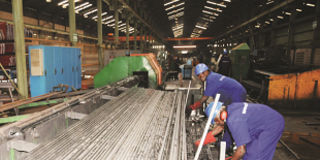Covid has affected essential workers more

What you need to know:
It is the farm worker in the village, the attendant in a supermarket or store, the frontline healthcare worker, the factory floor worker and other similar workers, who have continued to keep the least and the greatest economies moving in these pandemic times
The Covid-19 pandemic has made it clear that it is the workers in the foundational economy that are most essential for the economy, be it in economic thrival or in times of emergency such as this pandemic times. It is the farm worker in the village, the attendant in a supermarket or store, the frontline healthcare worker, the factory floor worker and other similar workers, who have continued to keep the least and the greatest economies moving in these pandemic times.
Unfortunately, it is these workers who have least enjoyed the privileges of employment. Most of them are doing precarious work in what the International Labour Organization (ILO) calls non-standard forms of employment. Their employment does not follow set out and agreed upon principles in the employer-employee relationship to constitute a legal and worthy contract of employment.
These issues of employment and work go on unnoticed even when we risk dire consequences as an economy. The workers have been incapacitated to collectively bargain and advocate for their rights; for decent work and relatively fair wages. The capitalist market system strives as hard as possible to maximally use labour with as little labour costs as possible. Moreover, capital now determines most of the economic and sociopolitical policy decisions of our society.
The neo-liberal system ushered in by the Structural Adjustment Programmes of the Bretton Woods Institutions - the World Bank and the International Monetary Fund - curtails the collective bargaining power of workers and continues to weaken trade union activity, making it almost impossible for the worker to have power and influence pertaining to work and employment.
Neo-liberalism and globalisation have worked to change the structure, make up and the whole idea of work and employment, and have almost distorted the original formal employer-employee relations in such a way that the worker cedes all their power to the employer.
As a result, employment has become temporary with workers on fixed term and project-based contracts; part-time where there’s work for fewer hours than normal; agency booking where labour is subcontracted and outsourced; and dependent on self-employment where there is work that appears independent, but is supervised by websites and phone applications, for example Uber drivers, Safeboda riders, Jumia delivery personnel, etc.
This ‘gig-economy’ serves to accumulate huge profits for capital making few people very wealthy while leaving the majority poor, including the labour that makes these profits possible.
The share of the national economy that goes into wages, hence rewarding labour, continues to dwindle. It is this share that determines the purchasing power of the bottom majority, and so the distortion of labour relations has a very negative effect on consumption and production. Inequalities, too, become sharper than ever before.
Workers must, therefore, be more agile, more organised and more united to take on the challenges of this new global order. Trade Unions must restructure and reform and develop new capacity to operate in these new circumstances. They must innovate new measures of unionising, uniting and empowering workers to have a voice and a fair share of their labour.
There must be committed efforts from the trade unions, civil society organisations, the media, government and the general public to put up checks to this neo-liberal thought that only serves a few individuals at the expense of the majority, and makes inequalities too sharp for the survival of our society.
Seith Kangume Barigye,




